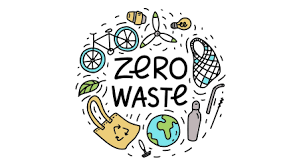Thrifty Thursday - Zero Waste Doesn't Have to Be Expensive

You buy less and buy better. Your relationship with consumption changes.
article By Katherine Martinko
from www.Treehugger.com
Published March 28, 2021 10:22AM EDT
I recently gave a talk about zero waste living to a group of university students. During the Q&A afterward, the inevitable question of cost came up. One student pointed out that he "can't afford to buy $30 deodorant." While the $30 price tag may be a bit generous even for the all-natural, plastic-free stuff that I like to put on my armpits (it's more like $20, which admittedly is still pricey), the student did raise a good point – that buying zero-waste products is often more expensive than their overly-packaged conventional counterparts.
I tried to handle the question as best I could in the moment, but I kept thinking about it afterward. This could be an entire talk of its own, so instead, I'm writing about it, as I'm sure many others have similar doubts and questions about their own abilities to reduce waste without breaking the bank.
People who want to go zero waste (or lower waste, which is a more apt descriptor for my own lifestyle) are not doing it to save money. They're doing it because they care about the amount of trash they generate, and they want to reduce it because they believe it's an important environmental issue.
Second, once you delve into the zero waste world, you quickly realize how pointless many products are. You start using fewer, buying less, and using them interchangeably. (Yes, the same lotion can be applied anywhere on the body!) Soon you'll find yourself spending less money overall, which offsets the higher cost of the zero waste ones. I'd estimate that the total number of products in my bathroom cabinet decreased by 50% when I became more focused on waste reduction.
If you stop to examine those zero-waste products, you'll see that they are usually of superior quality. Companies rarely redesign their packaging to be reusable, refillable, or compostable without also reformulating ingredients to be healthier, safer, and greener. (Admittedly, this is changing as more major companies are jumping on the anti-plastics bandwagon, e.g. Dove's new refillable deodorants.) So you're paying a premium not just for non-disposable packaging, but also for a better product that does less harm.
In my experience, higher-quality skincare products last longer than cheap ones. I only need a pea-size dollop of natural deodorant, a few quick swipes of shampoo bar on my wet hair, a single scoop of rich lotion to moisturize my skin. My personal habits have evolved, too. Knowing an item costs more leads me to use it more sparingly and use it to the very end.
If frugality is a top priority, then zero waste lends itself marvelously to DIY. When $20 is too much for natural deodorant, you can easily make your own from coconut oil, baking soda, and some essential oil. The price-per-unit is cheap and the product effective; I know because I've done it.
T
I think that someone new to zero/low waste living will quickly discover that it's not a straight item-for-item swap. You don't just start buying expensive reusable/refillable/package-free versions of the cheap disposables you used to buy. Instead, your entire relationship to consumption changes and you become discerning, better at making do and improvising, less inclined to shop in the first place, and more willing to spend money on purchases that reflect your new values.
A commenter on one of Miles' articles left this thought-provoking reflection:
"Zero waste has made me more privileged – I’ve learned that I need less, actually MUCH less than I thought I did when in my younger years. Because I now need less, I spend less, because I spend less I can afford to earn less, which means I can work less. This gives me more time to enjoy the things I do – gardening, preserving and making things and to spend more time with those I love."
To that student who got me thinking about this, I'd recommend starting with what matters to you, and it very well might not be fancy deodorant. That's OK; I didn't start there either. You don't have to switch everything, nor do it immediately. Zero waste is a gradual process. Over time you will accumulate the tools that make it easier, and you will figure out where you get the most value for your money. In return, you'll gain a sense of liberation from the consumer culture that cripples so many in our society, and a rewarding sense of accomplishment that you're doing something real and tangible for the planet.
#naturalhomebrands #ecofriendly #gogreen #zerowaste #ThriftyThursday
- Carole Zellers
Comments 0